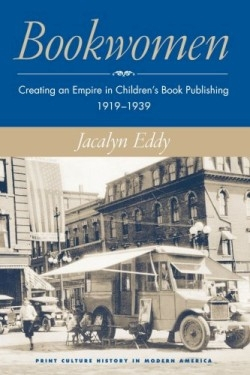Bookwomen
Creating an Empire in Children's Book Publishing 1919-1939
Given the abundance of quality children’s literature available today, and given the strong presence of women in the American workforce, it’s sometimes difficult to believe that only 100 years ago, neither scenario was widely available and accepted. In the period between 1919—1939, these two situations converged as a group of women, known as “Bookwomen,” worked to provide literature for children other than trashy books, while developing and fighting for the rights for their own careers. In this compelling new book, a specific group of women—two librarians, two editors, and the founders of the children’s periodical Horn Book—are profiled for their contributions both to the world of literature and to women’s rights.
As the author explains, the fact that these women had the careers they had was astonishing for the time period. The worlds of publishing and libraries were male-dominated, and women were not welcomed with open arms. Women weren’t expected to have careers, or even want them, Eddy points out: “fewer social expectations for women’s careers meant fewer consequences for failing. Because less prestige was tied to a woman’s career, it was easier to live without one.” But the Bookwomen were determined to create a world of high-quality children’s literature, and together they formed an alliance that in today’s world would be considered a high point of networking and teamwork.
Other social forces came into play, such as the rise of “child guidance” experts who were focused on dismantling the role of the mother by discrediting maternal intuition and common sense and warning against any kind of fantasy-oriented literature. The Bookwomen could see the value in both realistic and fantastic books and had to tread carefully through the minefields of social opinion. And while many of these women continued to champion their cause well past 1939, Eddy notes that the two decades prior saw significant changes in how children’s literature was written and perceived, due to the tireless efforts of the Bookwomen.
The author has a doctorate in American history and has written previous articles about the history of public libraries. This scholarly book, fully footnoted and based on thorough, documented research, reads more like a well-written narrative than an academic thesis. Readers interested in American history, literary or otherwise, will find much to enjoy. And thanks to these Bookwomen, generations of young readers have learned to appreciate good books.
Reviewed by
Amy Rea
Disclosure: This article is not an endorsement, but a review. The publisher of this book provided free copies of the book to have their book reviewed by a professional reviewer. No fee was paid by the publisher for this review. Foreword Reviews only recommends books that we love. Foreword Magazine, Inc. is disclosing this in accordance with the Federal Trade Commission’s 16 CFR, Part 255.

